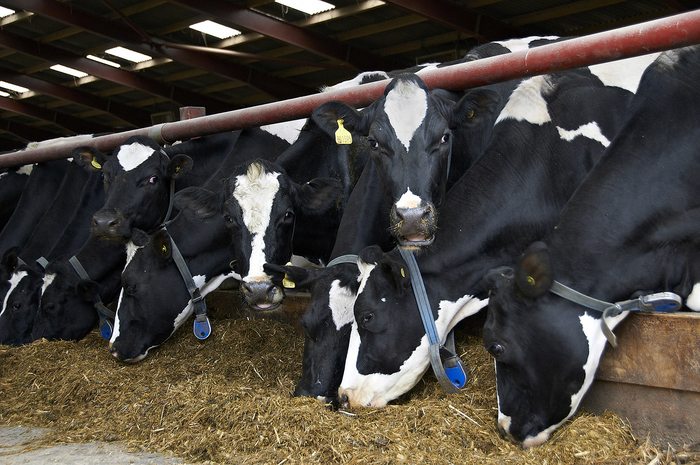New research from Michigan State University, USA, demonstrates significant improvements in cow productivity with specific fatty acid supplementation through early lactation.
The concept of feeding fat in dairy rations is nothing new – the energy-dense nutrient is hugely beneficial to meeting increased nutritional requirements as cows simultaneously produce milk while maintaining body condition ahead of breeding.
Something that is new however is the developing science which continues to improve our knowledge on the roles of different fatty acids, the building blocks of fat, on animal performance.
According to Dr Richard Kirkland, global technical manager for Volac Wilmar Feed Ingredients, research findings present dairy producers with opportunities to target specific fatty acid blends according to requirements on individual farms.
“Data indicate key roles for palmitic (C16:0) and oleic (C18:1) fatty acids at different stages of lactation and depending on requirements at farm level,” says Dr Kirkland.
“C16:0 is very beneficial in improving milk fat production and yield, but it is now clear that this may be at the expense of body condition and weight loss in early lactation, the knock-on effects of which may include poor fertility.
In contrast, delivering C18:1 to the small intestine, achieved by supplementing with rumen-protected calcium salts, improves total fat digestibility and can enhance fertility through improved egg and embryo development. Unlike C16:0, C18:1 helps partition nutrients toward body fat stores, reducing body condition loss in the critical early lactation period.”
The importance of C16:0 to C18:1 ratio
In a recent study presented at the American Dairy Science Conference in June 2020, Professor Adam Lock’s group from the Department of Animal Science, Michigan State University evaluated the response to Mega-Max, a rumen-protected fat supplement containing a 60:30 ratio of C16:0 to C18:1 on cow performance from calving through early lactation.
“There’s a long-standing industry dogma that fat shouldn’t be fed to fresh cows as body fat is also being mobilised to provide energy. However, findings from our previous research indicated this needs to be challenged and something that needed to be analysed further,” explains Professor Lock.
During the study, dairy cows were offered a control ration with or without supplementation with the Mega-Max calcium salt formulation from calving until 24 days in milk. From days 25-67 in milk each group was further subdivided into control or Mega-Max-supplemented rations.
“Throughout the fresh period (days 1-24 in milk), control and fat supplemented cows maintained similar body condition. However, the fat supplemented group saw notable increases in milk fat percentage and yield, resulting in 3.1 kg more energy corrected milk than the control group,” explains Professor Lock.
“Supplementing cows in the fresh period and then throughout the peak period (days 25-67 in milk), had no effect on dry matter intake but increased milk yield by 5.1 kg per day and milk fat content by 0.2%. This led to a significant increase in milk fat yield from 1.76 kg to 2.07 kg per day in control and fat-supplemented treatments, respectively. Crucially, this was achieved without increased loss of body weight or condition score.”
Managing the C16:0 to C18:1 ratio through lactation
Data from this new study support the concept that fatty acid profile through early lactation is crucial to ensuring production responses resulting from supplementation with fat do not push the cow into further negative energy balance.
These findings highlight the opportunity to manage the C16:0 to C18:1 ratio through lactation, says John Newbold, Professor of Dairy Nutrition at Scotland’s Rural College.
“It is clear that when considering fat supplements for dairy cows, lower C16:0, with higher C18:1, supplements are most appropriate through early lactation to help partition nutrients toward body reserves and prevent excessive body condition loss. Furthermore, providing more C18:1 to the ovary is beneficial for development of embryos and the improved digestibility provides an additional boost in megajoules,” explains Professor Newbold.
Calcium salts remain the only effective method of supplying C18:1 to the small intestine without disrupting rumen fibre digestion and reducing milk fat production, with the data from Michigan State indicating that a 60:30 ratio of C16:0 to C18:1 in calcium salt form is especially beneficial.
Moving into mid-lactation, target body condition score should be met so a higher C16:0 supplement can be considered to fuel milk and milk fat production, says Professor Newbold. For some farms, the supplementation of a high-C16:0 supplement at 80-90% C16:0, may be beneficial in late lactation to prevent cows from gaining excess body condition ahead of calving.
Sourcing the right fat supplement
When it comes to fat supplements, Dr Kirkland stresses the importance of rumen-protection. Rumen-protected fatty acids, such as calcium salt supplements, allow fat to be increased in the diet without negative effects on fibre digestion as is the case with liquid oils or high-fat ingredients such as brewer’s grains.
“Rumen-protection is also essential to deliver the unsaturated fatty acids, such as C18:1, to the small intestine for digestion and utilisation by the cow,” concludes Dr Kirkland.
“Working in tandem with sufficient dietary fat supply and most-appropriate fatty acid profiles, rumen-protected fat supplements offer producers the ability to meet specific nutritional requirements at varying stages of lactation to optimise herd performance.”


